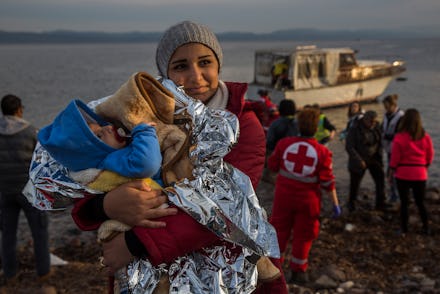Governors Are Refusing to Accept Syrian Refugees — But They Probably Can't

Just days after attacks in Paris left 132 dead and hundreds injured, governors across the United States announced that they would prevent Syrian refugees from resettling in their states after. The U.S. is on track to accept 10,000 refugees by the end of this year and up to 100,000 by the end of fiscal year 2017.
"After full consideration of this weekend's attacks of terror on innocent citizens in Paris, I will oppose any attempt to relocate Syrian refugees to Alabama through the U.S. Refugee Admissions Program," Alabama's Republican Gov. Robert Bentley said in a press release on Sunday. "As your governor, I will not stand complicit to a policy that places the citizens of Alabama in harm's way."
The sentiment was reiterated in sympathetic state capitals from Texas to Arkansas to Massachusetts. There's just one problem — the states probably can't refuse to accept refugees.
"States don't get to make immigration policy," Joseph Best, the founder and partner of Philadelphia's Best Immigration Law Group, told Mic. "It seems like it would be very ripe for litigation."
Indeed, past precedent for federal law would suggest that states have little, if any, role in refugee resettlement. Typically, refugee applications are handled by the State Department while screenings are conducted by the Department of Homeland Security. Actual resettlement is handed back over to State, which works in conjunction with the Department of Health and Human Services' Office of Refugee Resettlement.
When asked the question directly at a press conference, State Department deputy spokesman Mark Toner demurred on giving a definitive position. "Whether they can legally do that, I don't have an answer for you," he told reporters, according to Mother Jones. "I think our lawyers are looking at that."
Beyond the legal question, governors would also have to contend with the practical implications. With 10,000 refugees already in the pipeline, the logistics of stopping them now on a state-by-state basis would likely be impossible. According to Best, both state and federal funds have been allocated to various civic organizations like Catholic Charities and Lutheran Family Services to help resettle refugees. It's doubtful that governors would jeopardize those at this point.
Multiple attempts to contact relevant officials at Catholic Charities in Alabama, Texas and Massachusetts were unsuccessful.
Best was adamant that the roots of the controversy were grounded in something far more mundane than security: partisan politics.
"They're all grandstanding politically. This is all about politics," said Best. "They're trying to use this to scare people into politically supporting them. It's classic demagoguery."
Indeed, as many commentators have pointed out, the 10,000 refugees the U.S. is on track to accept pales in comparison to Europe's contribution. Germany, for example, is on track to accept 500,000 refugees per year for the next several years.
So far, President Barack Obama has showed no sign of bowing to state demands, taking the unusual step of publicly chastising calls by political leaders the U.S. while on foreign soil. At the G20 summit in in Antalya, Turkey, Obama laid into comments made by Republican presidential candidates Jeb Bush and Ted Cruz, which seemed to imply that Christian refugees might be more acceptable than Muslim ones.
"When I hear folks say, 'Well, maybe we should just admit the Christians and not the Muslims,' when I hear political leaders suggesting there should be a religious test for which person who's fleeing from a war torn country — that's shameful," Obama said during a press conference at the summit. "That's not American. That's not who we are. We don't have religious tests to our compassion."
Speaking to Fox News Sunday, Deputy National Security Adviser Ben Rhodes also dismissed the governors' concerns. "We had very robust vetting procedures for those refugees," he said, adding a note of compassion on Meet the Press. "We're also dealing with people who've suffered the horrors of war — women and children, orphans. We can't just shut our doors to those people."